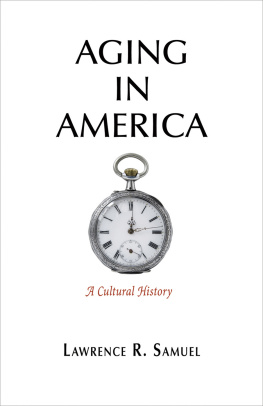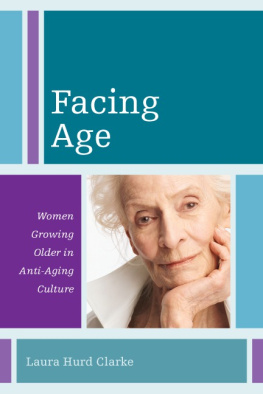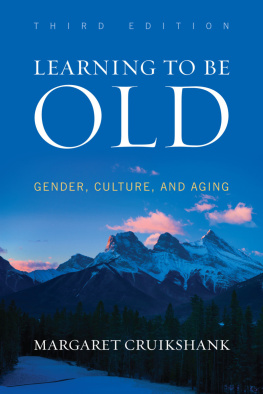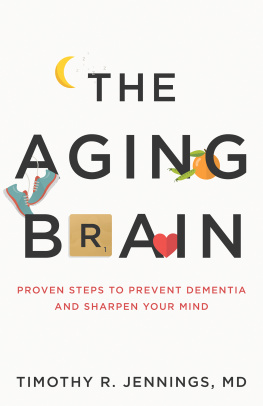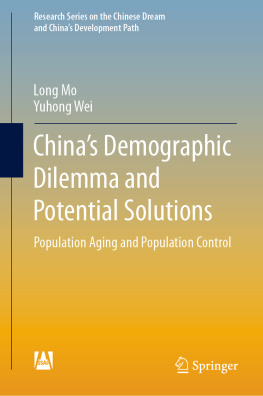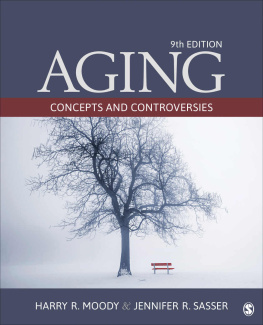AGING IN WORLD HISTORY
In Aging in World History, David G. Troyansky presents the first global history of aging. At a time when demographic aging has become a source of worldwide concern and more people are reaching an advanced age than ever before, coming to terms with the history of old age informs the discourse of aging in the modern world. This concise volume expands that history beyond the West to show how attitudes toward aging, the experiences of the aged, and relevant demographic patterns have varied and coalesced over time and across the world.
From the ancient world to the present, this book introduces students and general readers to the history of aging on two levels: the experience of individual men and women, and the transformation of populations. With its attention to cultural traditions, medicalization, decades of historical scholarship, and current gerontology, Aging in World History is the perfect starting point for an exploration of this increasingly universal aspect of human experience.
David G. Troyansky is Professor of History at Brooklyn College and the Graduate Center, City University of New York
THEMES IN WORLD HISTORY
Series editor: Peter N. Stearns
The Themes in World History series offers focused treatment of a range of human experiences and institutions in the world history context. The purpose is to provide serious, if brief, discussions of important topics as additions to textbook coverage and document collections. The treatments will allow students to probe particular facets of the human story in greater depth than textbook coverage allows, and to gain a fuller sense of historians analytical methods and debates in the process. Each topic is handled over time allowing discussions of changes and continuities. Each topic is assessed in terms of a range of different societies and religions allowing comparisons of relevant similarities and differences. Each book in the series helps readers deal with world history in action, evaluating global contexts as they work through some of the key components of human society and human life.
Gender in World History
Peter N. Stearns
Consumerism in World History: The Global Transformation of Desire
Peter N. Stearns
Warfare in World History
Michael S. Neiberg
Disease and Medicine in World History
Sheldon Watts
Western Civilization in World History
Peter N. Stearns
The Indian Ocean in World History
Milo Kearney
Asian Democracy in World History
Alan T. Wood
Revolutions in World History
Michael D. Richards
Migration in World History
Patrick Manning
Sports in World History
David G. McComb
The United States inWorld History
Edward J. Davies, II
Food in World History
Jeffrey M. Pilcher
Childhood in World History
Peter N. Stearns
Religion in World History
John Super and Briane Turley
Poverty in World History
Steven M Beaudoin
Premodern Travel in World History
Steven S. Gosch and Peter N. Stearns
Premodern Trade in World History
Richard L. Smith
Sexuality in World History
Peter N. Stearns
Globalization in World History
Peter N. Stearns
Jews and Judaism inWorld History
Howard N. Lupovitch
The Environment inWorld History
Stephen Mosley
Agriculture in World History
Mark B. Tauger
Science in World History
James Trefil
Alcohol in World History
Gina Hames
Human Rights in World History
Peter N. Stearns
Peace in World History
Peter N. Stearns
The Atlantic Slave Trade in World History
Jeremy Black
Aging in World History
David G. Troyansky
AGING IN WORLD HISTORY
David G. Troyansky
First published 2016
by Routledge
711 Third Avenue, New York, NY 10017
and by Routledge
2 Park Square, Milton Park, Abingdon, Oxon OX14 4RN
Routledge is an imprint of the Taylor & Francis Group, an informa business
2016 David G. Troyansky
The right of David G. Troyansky to be identified as author of this work has been asserted by him in accordance with sections 77 and 78 of the Copyright, Designs and Patents Act 1988.
All rights reserved. No part of this book may be reprinted or reproduced or utilised in any form or by any electronic, mechanical, or other means, now known or hereafter invented, including photocopying and recording, or in any information storage or retrieval system, without permission in writing from the publishers.
Trademark notice: Product or corporate names may be trademarks or registered trademarks, and are used only for identification and explanation without intent to infringe.
Library of Congress Cataloging in Publication Data
Troyansky, David G.
Aging in world history / David G. Troyansky.
pages cm. (Themes in world history)
Includes index.
1. AgingHistory. 2. Older peopleHistory. 3. Population agingHistory.
I. Title.
HQ1061.T78 2015
305.26dc23
2015012868
ISBN: 978-0-415-77906-7 (hbk)
ISBN: 978-0-415-77907-4 (pbk)
ISBN: 978-1-315-67518-3 (ebk)
For my father
et pour Franoise Cribier
Every book takes time. This one took longer than expected. Peter Stearns asked me several times to write it. Eventually, I agreed. Stephen Gosch, Joel Rosenthal, and Pat Thane reviewed the proposal and offered thoughtful and helpful suggestions that gave me the courage to overcome my residual resistance. The existing scholarship on the history of aging and the aged is very Western, and this book is part of a series in world history. It has required me to learn about places that are far from my usual scholarly concerns. For that Im grateful. Even though I am now turning back to a topic in French history, my approach will forever be more global. The delay was also the result of having taken on administrative responsibilities for longer than expected. Happily, a sabbatical from Brooklyn College allowed me to finish. I thank Chairperson Chris Ebert, Provost Bill Tramontano, fellow Francophone scholar President Karen Gould, and the department staff, Arline Neftleberg, Anne Ciarlo, and Lorraine Greenfield. Thanks to the Tow Professorship for important financial assistance. Dean Kimberley Phillips and I shared thoughts on balancing scholarship and administration (and much else), and Interim Dean Matthew Moore provided support and friendship over dinners and chamber music. I wouldnt have gotten through all that administrative work if not for the guidance of fellow chairs, who, like my inspiring students, really are too numerous to name. Kyle Francis, who has launched his own career as a historian, provided bibliographical assistance at the Graduate Center of CUNY. He and current student Megan Brown provided help at an important time. At the last minute, Helen Georgas of the Brooklyn College Library made a crucial purchase and old friend and colleague Robert Aldrich sent news of a new publication before boarding a plane in Bangkok. The editorial team at Routledge was very kind about adjusting the schedule of delivery. Thanks to Kimberly Guinta and her predecessors. When I finally submitted a draft, Peter Stearns took about a day to send suggestions for revision. They were important, and they were feasible, as were the recommendations on the next draft. We should all have such editors.




